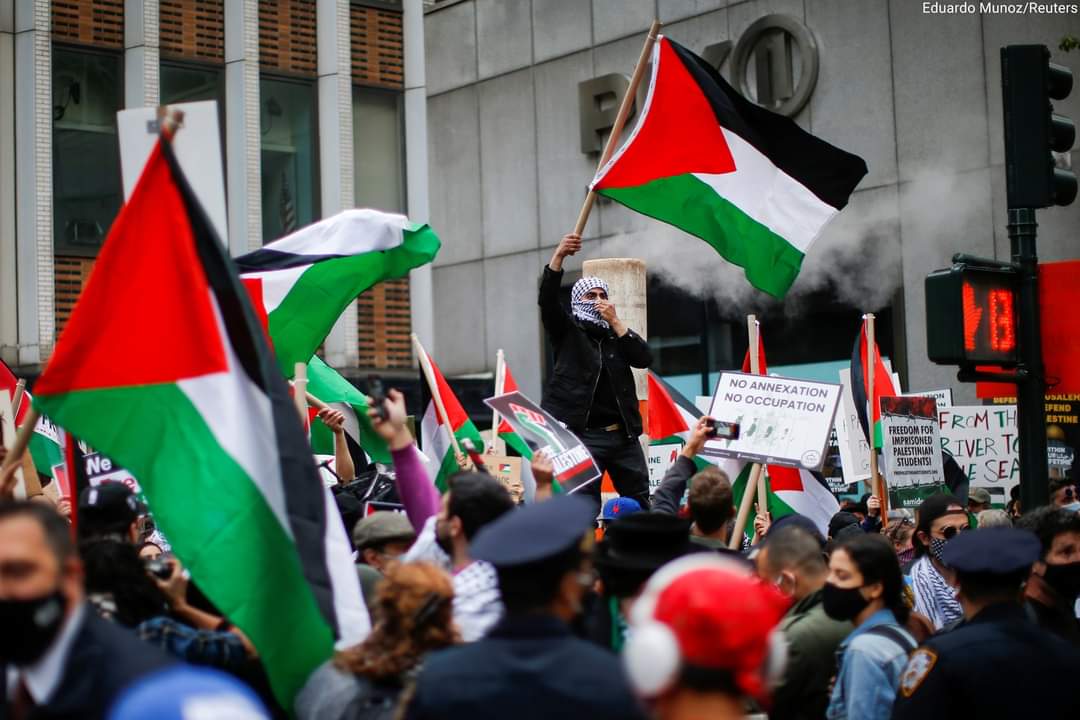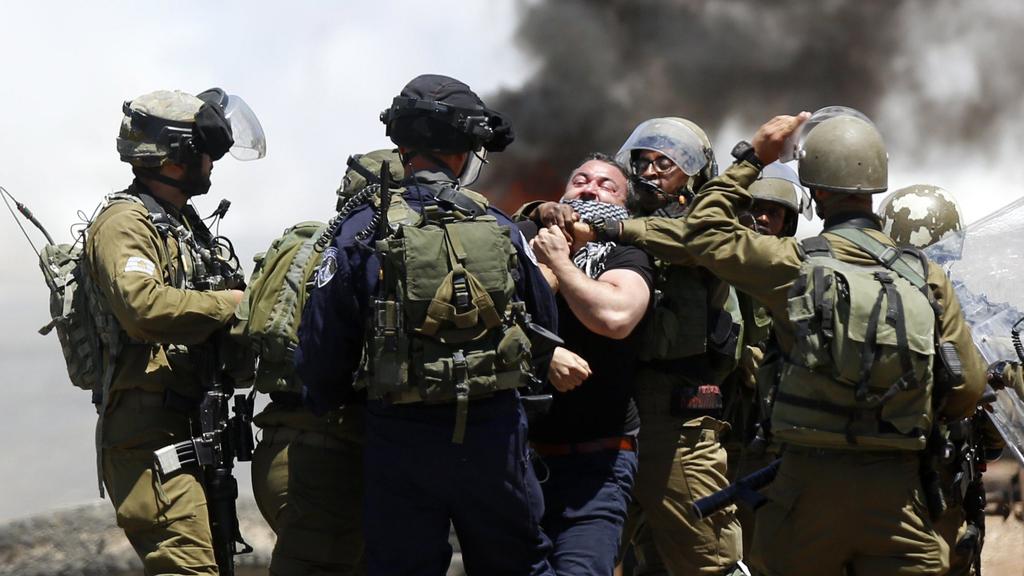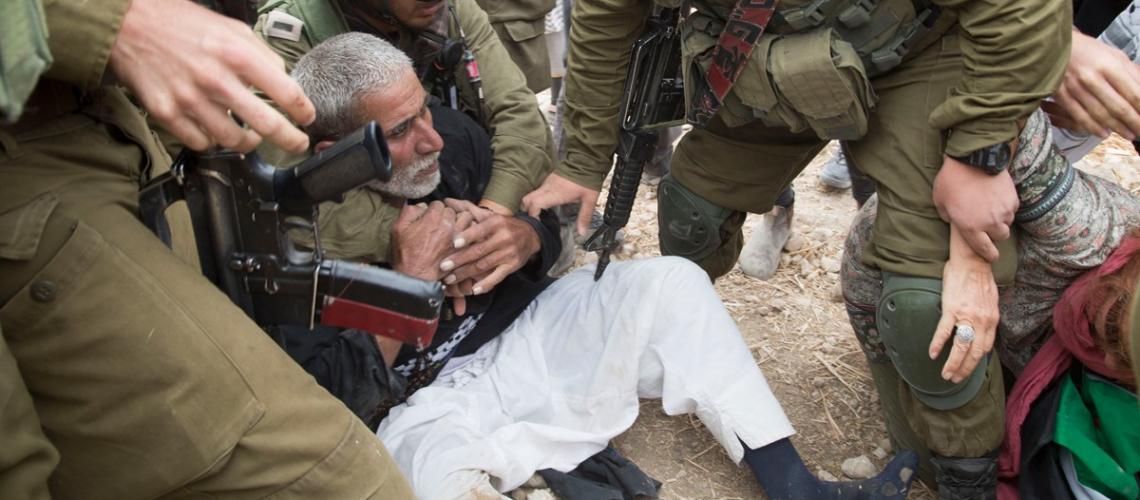Many people think of Israel and Palestine as two countries at war; with Israel, a state for Jewish people, occupying Palestine, where Palestinians live.
The truth is both Israeli Jews and Palestinians live all over the territory, ruled by one government and one army based on the idea of advancing the supremacy and domination of one group of people of Jews and that is what guides its policies and its practices towards Palestinians. In other words: Apartheid.

Apartheid is a loaded word, tied to the racist South African regime of white minority rule. But, although the word comes from there, apartheid isn’t just a description of what happened there in South Africa; it’s actually a crime against humanity under international law.
in 2021, Human Rights Watch accused Israel of carrying out apartheid. It’s based on the accusation on the 1973 apartheid convention and the 1998 Rome Statue, which says that three elements have to occur for the crime of apartheid to apply.
They are:
- An intent by one group to dominate the other
- Systematic oppression by one racial group over another
- One or more inhumane act like:
- Denying people “the right to leave and return to their country”
- Expropriation of landed property
- Creation of separate reserves and ghettos
So let’s see if any of these apply to Israeli’s rule over Palestinians.
About half of the people that live there under Israeli’s rule are Palestinian and the other half are Jews. For those 7 million Israeli Jews, almost the entire land is one space, no matter where they’re placed, north, south, west, or east, they have the same right, privileges, and legal status.
They can move freely, vote in the same elections, and live under the same laws. The boundaries are invisible for them.
But for the 7 million Palestinians, the boundaries are very visible. Whereas the land is essentially one place for Israelis, Palestinians have been divided into four areas. Each area gets a different colored ID card issued by Israel, and your life and rights are determined by that ID card.
In Gaza (2.1 million people), Palestinians have no freedom of movement and are under a complete Israeli blockade. Israel is no longer has soldiers inside Gaza, but it controls every aspect of life from the outside. People in Gaza have no civil or political rights. They’ve got no say in the Israeli government that controls them.
Palestinians in the West Bank (2.7 million people) also have very limited freedom of movement, with their population divided into 165 disconnected cantons cut off by Israeli military checkpoints, walls, settlements, and other infrastructure. They also have no civil and political rights in Israel.
In East Jerusalem (400 thousand people) Palestinians have generally more freedom to move, but Israel can take away their right to live in the city. They can’t vote in Israeli elections, and Israel also bars them from taking part in Palestinian politics.
Palestinians who are citizens of Israel (1.6 million people) can relatively travel freely, but they face restrictions on where they can live. They can vote in Israeli elections, but face legalized discrimination.
Yara Hawari is a Palestinian with Israeli citizenship. She says:
This ID system, it penetrates all areas of life where you live, where you study, what you work, etc. Even more intimate areas of life, such as as who you marry.
That’s because, for the most part, a Palestinian can’t pass on their ID status to their spouse. She continues:
And this has huge implications on where they can live. Many indeed actually end up leaving and choosing to live abroad because it’s that difficult.
On rare occasions, Palestinians are able to change their ID, but only in one direction. So for instance, if a Palestinian from East Jerusalem moves somewhere else in the West Bank, they can lose their residency in East Jerusalem and Israel. Since it’s considered that a downgrade, then that’s a direction that would be feasible.
And further down the line, from Israel’s perspective, if West Bankers move to Gaza Strip, then that’s a direction that Israel will accept, but not the opposite direction. So while Palestinians are granted different rights based on their IDs, nowhere do those rights match those of Israeli Jews.
Looks like we can check off at least one of the elements required for apartheid to apply (an intent by one group to dominate the other).

When Israel was founded in 1948, 700 thousand Palestinians had fled or been forced out. The result was that the new state had a Jewish majority. To maintain that majority, Israel has never allowed the refugees to return. The Palestinians who remained were given Israeli citizenship, although they were kept under strict military rule for 19 years.
But, in 1967, when Israel occupied more lands, including the Gaza, West Bank, and East Jerusalem, it faced a problem. It wanted the land, but didn’t want the Palestinians on that land. So it’s refused to extend citizenship to the rest of the Palestinians under its control, while keeping them under the military rule ever since.
To further control the ratio of Palestinians to Israeli Jews, Israel still bans Palestinians refugees and their descendants from moving into any of the territories it controls, while encouraging any Jewish person anywhere in the world to immigrate to Israel, even if they’ve never set foot there before.
In Jerusalem, the Israeli authorities actually have a population target: 60% Jews to 40% Palestinians. Palestinians in Jerusalem are only granted a permanent residency permit, even if they’ve been living in the city since before Israel was founded.
About 350 thousand Palestinians are in that status, which is Orwellian the way it’s defined, because the only thing permanent in permanent residency is that it actually always be taken away. These permits can be revoked if a Palestinian moves out of the city but Jewish Israelis living in Jerusalem never lose residency, even if they move to the other side of the world.
This discrimination has been enshrined in Israeli law. The 2018 Nation-State law says that Israel “is the nation-state of the Jewish people.” “The right to national self-determination in the state of Israel is unique to the Jewish people.”
That means that even Palestinians with Israeli citizenship aren’t considered equal to Jews with Israeli citizenship. As Israeli’s prime minister Benjamin Netanyahu put it, “Israel is not a state of all its citizens” but rather “the nation-state of the Jewish people and only them.”
So let’s go back to that list from before. Second item, systematic oppression by one racial group over another, checked.
The Nation-State Law is only one of many Israeli laws that explicitly discriminates against Palestinians. For example, there’s the 1950 Absentees’ Property Law. Deeming Palestinian refugees “absentees,” Israel seized hundreds of thousands of acres of their lands, even though they were only absent because Israel wouldn’t let them return.
Remember, denying people the right to return to their country is on the list of inhumane acts that legally make up the third element of apartheid.
There are more Israeli policies that could fall under the category of inhumane act, especially when it comes to land. So Israel desires the land, even more so, desires empty land, or land that it makes empty, and doesn’t desire the Palestinians living on that land.
And that has resulted in policies in which land is constantly moving in one direction. Land that used to be Palestinian becomes state land, and then that land is allocated for the development of towns and communities for Jewish citizens.
And yes, expropriation of land is also an inhumane act, which checks another item on our list.

So let’s see what’s that looks like on the ground. Across the entire territory, Palestinian communities are overcrowded and surrounded by Jewish-only communities. It’s the same type of practice of encircling Palestinians communities so that they can’t expand, cutting them off from one another.
It’s a continuous practice that began in 1948. and was expanded to the West Bank in 1967. The Israeli state prioritizes Jewish development in places where it wants to restrict the growth of Palestinian communities, with the government keen to Judaize areas like the the Galilee and the Negev.
Israeli politicians frequently use that term: to “Judaize” an area. In other words, to ensure Israeli Jewish dominance in a particular area where the government has a concern over the Palestinians demography. And in any other context, this would be condemned as, you know, gross ethnic engineering.
It’s in its basic laws, which is essentially the Israeli Constitution. The land is deemed for the Jewish people, not the Israeli people. In fact, only 3% of the land inside the Israel’s 1948 borders is allocated for its Palestinian citizens. Meanwhile, hundreds of new communities have been built for its Jewish citizens, many on the ruins of destroyed Palestinian villages.
Plus, there’s 200 illegal Jewish settlements that have been built across the West Bank as well. At the same time, thousands of Palestinian homes have been demolished or are under threat of demolition, having been built without permits because Israel rejects most Palestinians building applications.
Meanwhile, in the Negev Desert, the Israeli government wants to maximize the land available for the Jewish development. So it has tried to force Palestinian Bedouin citizens into small townships by demolishing their homes and not allowing them to connect to the water and power grids.

One village, Al-Araqib, has been demolished more than 180 times. Now just across the Green Line, a similar struggle is taking place in the village of Susiya, which is in the West Bank, just south of Hebron and it too has faced a series of mass demolitions by authorities in attempt to establish Israeili Jewish control over the area.
Looks like we can check of f another one of the criteria for apartheid (the creation of separate reserves and ghettos).
Israel has total control of this entire territory. Even in Gaza and the West bank, which have some limited autonomous Palestinian administration in place, Israel controls the borders, trade, resources, water, electricity, the airspace, the electromagnetic spectrum, the population registry, and more.
Accusing a government of carrying out a crime against humanity like apartheid is no simple matter. But we’ve seen how Israel’s control over and discrimination against Palestinians fits the legal threshold for apartheid.
Israel’s own leaders knew this was happening, although they didn’t do much to stop it.
On a program named Conflict Zone aired on Deutsche Welle, Tim Sebastian asks “but but the state you have at the moment is an apartheid state, isn’t it?” and Ehud barak, former Israel prime minister answers “[…] but it might come on this slippery slope toward apartheid.”
Still, how could apartheid apply to Israel when, say, Palestinian citizens can vote? Yara hawari answers:
So as a Palestinians citizen of Israel, I cannot question the fundamental Constitution of Israel, which says that the state is for the Jewish people and the Jewish people alone. My citizenship doesn’t allow for inclusion in that state. And so therefore, participation in Israeli elections or in the Knesset is really nominal and has no potential to change policy.
Another argument against the accusation of apartheid is that the occupation is only temporary and when it ends, Palestinians will rule themselves.
Normal people don’t think that 54 years is temporary. We’ve passed that line already a very long time ago. And yeah, there’s a lot of Israeli propaganda insisting on what worldview of democracy plus temporary occupation. No, it’s not a democracy and it’s not a temporary occupation.
It’s one regime between the river and the sea and the regime is apartheid.
